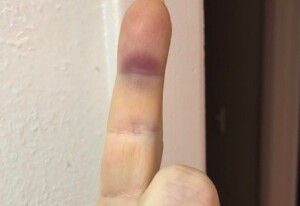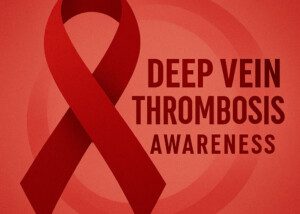Are you a habitual knuckle cracker and are worried that all the popping will cause a blood clot in a finger or worse, the joint that’s being cracked?
It’s reasonable to wonder about the possibility of a blood clot in the joint, or some type of vascular outcome, if one either cracks their knuckles very often and/or, when they do so, it’s forceful and creates an especially loud pop.
The sound produced when knuckles get “cracked” comes from the rapid release of gas bubbles that form in the synovial fluid, which lubricates the joints.
When you stretch or bend the finger joints, the pressure in the joint changes, causing these bubbles to burst and create the familiar popping sound.
Though the concern over knuckle cracking has classically fixated on whether or not it causes arthritis (it doesn’t), what about even a tiny blood clot?
“Blood clots in the hands or fingers in the veins are relatively rare,” says Dr. Lawrence Presant, DO, chief medical officer at Arizona Vein Specialists, and an expert on blood clots.
“Knuckle cracking in and of itself does not cause blood clots.
“Most problems with blood clots [in the upper body] usually occur in the shoulder area.
“This is common in pitchers in both softball and baseball.”
If cracking one’s knuckles does not and cannot cause blood clot formation in a finger, then what can?
Usually, it’s from injury or trauma, infection, surgery on the hand or fingers, a clotting disorder or prolonged compression, such as from a tight ring.
Symptoms such as pain, swelling, redness or warmth in the finger, or if the finger becomes cold and pale, could indicate a more serious problem.
If left untreated, a clot could lead to complications, including impaired blood flow or potential spread of the clot to other areas.
This all sounds scary – and it is – IF you have a blood clot in a digit.
Has a brick fallen on a finger lately? Was it caught in a door? Did a dog try to bite off a finger?
These are the things that may cause a clot to form.
But cracking your knuckles? You can confidently cross this habit off the list of risk factors for any type of blood clot.
 Dr. Lawrence Presant, DO, is chief medical officer at Arizona Vein Specialists in Phoenix, and a certified diplomat of the American Board of Venous and Lymphatic Medicine. A vein surgeon specialist, his passion is phlebology, the diagnosis and treatment of painful and unsightly vein disorders.
Dr. Lawrence Presant, DO, is chief medical officer at Arizona Vein Specialists in Phoenix, and a certified diplomat of the American Board of Venous and Lymphatic Medicine. A vein surgeon specialist, his passion is phlebology, the diagnosis and treatment of painful and unsightly vein disorders.
 Lorra Garrick is a former personal trainer certified through the American Council on Exercise. At Bally Total Fitness she trained women and men of all ages for fat loss, muscle building, fitness and improved health.
Lorra Garrick is a former personal trainer certified through the American Council on Exercise. At Bally Total Fitness she trained women and men of all ages for fat loss, muscle building, fitness and improved health.
.










































